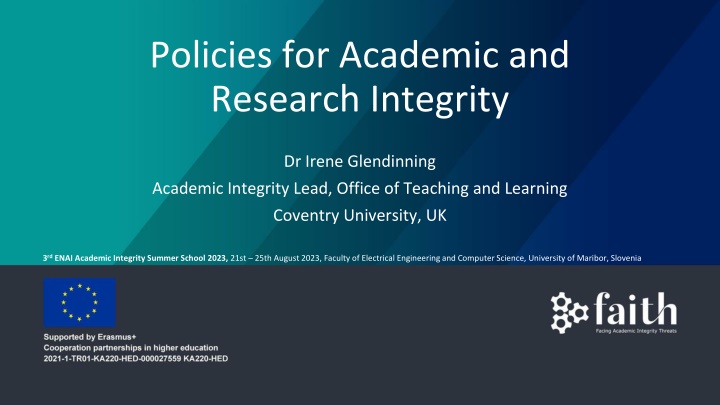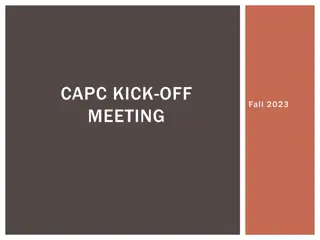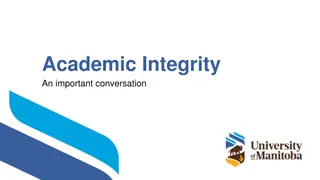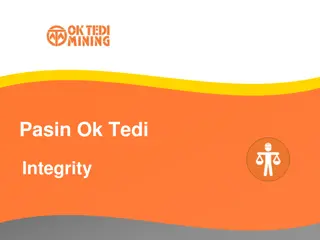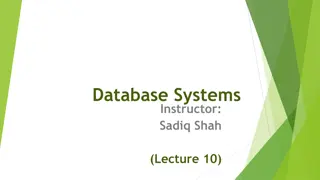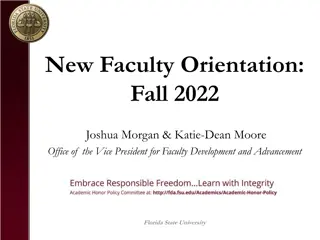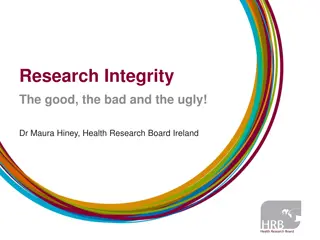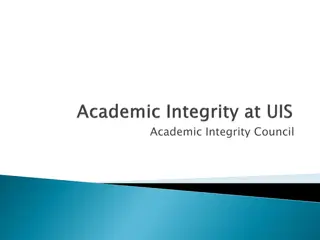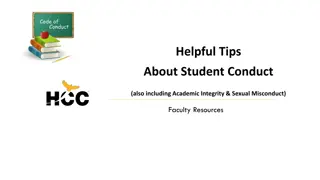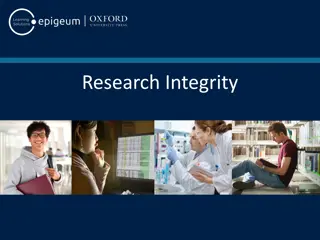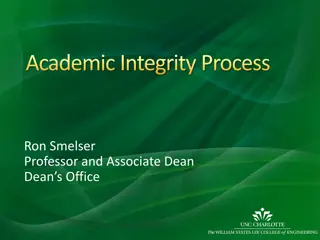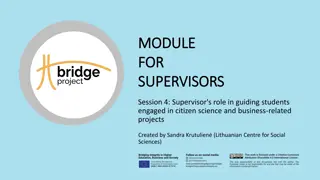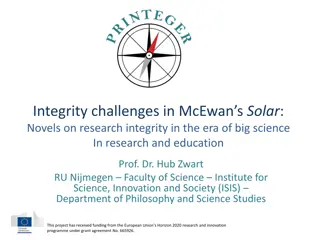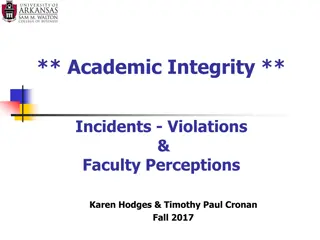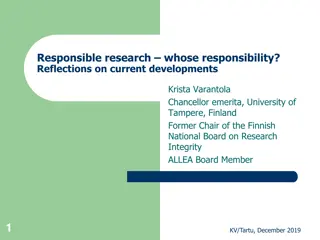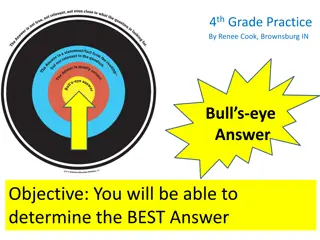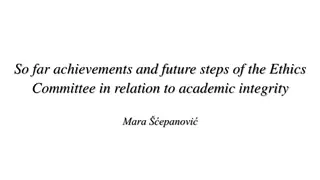Policies for Academic and Research Integrity
This session led by Dr. Irene Glendinning will focus on academic integrity policies and practices to enhance research integrity. Join the discussion at the ENAI Academic Integrity Summer School 2023 to delve into key aspects promoting academic honesty and ethical practices in academia.
Download Presentation

Please find below an Image/Link to download the presentation.
The content on the website is provided AS IS for your information and personal use only. It may not be sold, licensed, or shared on other websites without obtaining consent from the author.If you encounter any issues during the download, it is possible that the publisher has removed the file from their server.
You are allowed to download the files provided on this website for personal or commercial use, subject to the condition that they are used lawfully. All files are the property of their respective owners.
The content on the website is provided AS IS for your information and personal use only. It may not be sold, licensed, or shared on other websites without obtaining consent from the author.
E N D
Presentation Transcript
Policies for Academic and Research Integrity Dr Irene Glendinning Academic Integrity Lead, Office of Teaching and Learning Coventry University, UK 3rdENAI Academic Integrity Summer School 2023, 21st 25th August 2023, Faculty of Electrical Engineering and Computer Science, University of Maribor, Slovenia
Agenda Strategy, definition and scope of academic and research integrity Education for academic integrity Academic conduct procedures Ethics and research integrity Outcomes / sanctions / penalties Involving students Quality, standards and Integrity, Q&A
Academic Integrity for use with students Academic Integrity is about: behaving with honesty and showing respect for others; taking responsibility for your own learning and development; adopting an ethical and professional approach towards work, study and your private life. Your assessments have been designed: To be an integral part of your learning and development For applying learning, knowledge and skills To evaluate your learning and understanding To provide constructive feedback on how you can improve For praising, encouraging and rewarding excellence To evidence your achievements To contribute to your qualification grade
SCOPE OF ACADEMIC INTEGRITY POLICIES (Glendinning, 2022, p. 208.)
Academic Integrity Strategy Academic Integrity underpins quality and standards Consistent approach Supported by clear guidance and training for all Education-led Steering group monitoring Use of statistics to understand and improve Working with students Pro-activity research and development
Pre-arrival guidance on academic integrity Induction quiz, video, diagnostic writing Initial education about academic integrity and ethical conduct don t forget late arrivals Training on academic writing, ethical and study skills throughout study, all semesters, all years, building knowledge and skills Academic writing, referencing, paraphrasing, critical thinking Library skills, finding and understanding academic sources Tutorial specific to student s needs Education for Academic Integrity Action plan, monitoring and support Corrective guidance and support following academic misconduct
Research Integrity Research Degree Quality Assurance and approval process Ethical approval process Research conduct procedures Regular training, development, updates for staff and students Research skills, research methods, ethical conduct Supervisor training, Principal Investigator training Ethical approval Training for ethics leads and reviewers Codes of conduct Annual progress and review meetings for PGRs
Study & assessment literacy Writing & referencing skills Essential skills for HE study Developed throughout the student journey Academic & research integrity Thinking & analytical skills Educational themes relating to academic & research integrity Preparing for future work and study Plus career capabilities Research skills
Knowledge & skills relating to academic integrity Collecting information, note- taking Study skills, expectations Interpreting similarity reports Evaluating & using sources Language skills Avoiding academic misconduct allegations Referencing & citation Academic writing Paraphrasing Digital literacy Reporting academic dishonesty Critical thinking, rhetoric Editing, reviewing, summarising Exam protocol Academic integrity Data collection methods & protocols Managing and protecting data Ethical conduct and approval Creativity, analytical skills Research skills Giving and responding to feedback Literacy on transformative and generative AI tools Employability and professional skills Time and project management Effective team- working
Academic Conduct Coventry University Group Academic Conduct Panel (ACP) chair leads local team: Panel = Chair 1+ ACO, 1 other Local registry team coordinates, records, advises on regulations Senior Academic Conduct Officers (ACOs) triage allegations is there a case to answer? ACOs manage routine cases, ACPs hear complex and very serious cases Group-wide consistency of approach achieved by ACO Guidance Notes + Scale of Outcomes Table Benchmarking of ACO decisions by an ACP Regular training for ACOs Regular training for all other staff Monitoring by steering Group (AISG), reporting to QuiLT (Quality in learning and teaching) Academic Integrity Unit, overall coordination and support, pro-activity All follow General Regulations Appendix 1
Academic conduct procedures Registry / Lead ACO: Triage ACO: Initial decision ACO meeting Appeal, mitigation AC viva AC Panel Consider evidence, Academic process Extra assessment Student asked about process, content, sources, support etc Present evidence, student responds Are there valid grounds ACP meets Registrar advises ACOa presents the case Student responds Is there a case to answer? NCTA PAP Minor + Decision on severity History considered Decision on outcomes using table and guidance notes Contract cheating Collusion Yes: Pass to ACP Student responds Yes: Assign ACO to case No: pass back to tutor More evidence needed or mark on merit Panel of 3 plus registrar ACO presents case Students responds, panel asks questions Decision taken Mark on merit Schedule ACO meeting Schedule AC Viva Schedule ACP Decision: Learning outcomes met? Yes: NCTA No: schedule ACO or ACP meeting No: refuse request Guidance for student on next steps & educational element
2023-24: Definition of academic misconduct 1.6.1 Academic misconduct includes ethical misconduct and is defined as: a) any attempt to gain an unfair advantage in an assessment (including examinations/tests). This includes (but is not confined to): List 1: types of academic misconduct b) failure to observe the University s Principles and Standards of Conduct on the Governance of Applied Research, including: List 2: types of research misconduct c) assisting another student to do any of the above.
List 1: Definition of academic misconduct, page 1 of 31.6.1 Academic misconduct includes ethical misconduct and is defined as: a)any attempt to gain an unfair advantage in an assessment (including examinations/tests). This includes (but is not confined to): i) copying from other students; ii) collusion - unauthorised sharing of solutions and working with others when individual work is required; iii) impersonation - arranging for someone else to complete a test or examination on one s behalf; iv) plagiarism - presenting the work of others without acknowledging the sources and submitting it as if it is one s own work; v) submitting work that has been wholly or partially written by a third party, (contract cheating requesting work to be completed on one s behalf by a colleague, friend, family member, essay mill, ghost-writer etc.); vi) self-plagiarism, - the unacknowledged or un-referenced re-presentation of one s own work (the submission of work presented previously or simultaneously for summative assessment at this or any other institution), unless explicitly allowed; vii) unauthorised access to unseen examination papers or model answers; viii) attempted or proven bribery; ix) falsification or fabrication of data or results in projects, surveys or other assessed work; continued
List 1: Definition of academic misconduct, page 2 of 31.6.1 Academic misconduct includes ethical misconduct and is defined as: a)any attempt to gain an unfair advantage in an assessment (including examinations/tests). This includes (but is not confined to): x) the act of uploading assessment tasks, course materials, solutions or other coursework to a website, social media or other such portal; xi) making a request, via a website, social media or other such portal, to ask for help with completing assessment tasks, or to request the provision of a finished or partially finished assignment; xii) Unauthorised or unacknowledged use of technological aids and artificial intelligence, including translation software, paraphrasing tools, text generation software (essay bots), and tools to generate programming code, graphics or artwork; xiii) where an assignment is required to be written in a specified language, writing all or most of it in another language and then using translation software or assistance from a third party to convert into the specified language; xiv) deception - converting text to graphical objects, screenshots, hidden or special fonts and characters in one s work in an attempt to disguise plagiarism, reduce the text similarity percentage or change the word count; xv) misrepresentation including invented or irrelevant references, or copying an entire reference list from another source into one s own work; Continued
List 1: Definition of academic misconduct, page 3 of 31.6.1 Academic misconduct includes ethical misconduct and is defined as: a)any attempt to gain an unfair advantage in an assessment (including examinations/tests). This includes (but is not confined to): xvi) switching off a web cam or microphone during a remote on-line examination/test, or leaving the view of the camera; xvii) attempting to communicate with anyone other than the invigilator during an examination/test, including anyone else being in the room where a remote examination/test is taking place; xviii) having access to unauthorised materials in an examination room/assessment space. This includes any calculator or dictionary not permitted under General Regulations appendices 8 and 9, pencil cases, manuals for calculators, spare paper or any notes written on anything, including parts of the body; xix) having access to a mobile telephone, electronic equipment including watch, technology- enabled spectacles and other devices in an examination room/assessment space, whether switched off or not; xx) refusal to provide evidence when asked about whether or not one has access to unauthorised equipment or material
List 2: Definition of ethical and research misconduct Failure to observe the University s Principles and Standards of Conduct on the Governance of Applied Research, including: i) failure to follow accepted procedures/codes of practice, or to exercise due care in carrying out responsibilities for avoiding unreasonable risk or harm to: humans; animals; cells, blood, tissues; the environment; the reputation of the University; ii) failure to obtain ethical approval for an assessment submission; iii) late submission of ethical approval applications, including cases where data has already been collected (which may involve deception); iv) breach of ethical approval conditions, including deviations from an approved research design; v) failure to renew or reapply for ethical approval when changes have occurred that have ethical implications; vi) failure to safeguard data, as well as the inappropriate handling of privileged or private information on individuals collected during research; vii) failure to follow the Computer Use, Data Management and Data Protection policies specific to storing and destroying data securely; viii)fabrication, falsification and misrepresentation of information contained within an ethics application (including misrepresentation of possible conflicts of interest and risk).
Coventry University Ethical Approval All research carried out by staff and students at Coventry University requires ethical approval.
COVENTRY UNIVERSITY: SCALE OF OUTCOMES FOR ACADEMIC INTEGRITY BREACHES WITH EXPLANATORY NOTES FOR STUDENTS AIU December 2021
Recording upheld cases Note added to student s record Reflected in student references Impacts on professional registration More serious outcomes applied for repeat cases Problem areas identified and addressed Trends monitored over time targeted measures applied (Adapted from Glendinning & Orim, 2023. p.36)
Student assessments need to be designed: To be an integral part of student learning and development For applying learning, knowledge and skills To evaluate the student s learning and understanding To provide constructive feedback on how the student can improve For praising, encouraging and rewarding excellence To evidence the student s achievements To contribute to the student s qualification grade To evaluate the process followed and critical thinking skills, not just knowledge If students do not complete their own work: They have not fully benefited from learning and development opportunities They have not learnt how to apply their learning, knowledge and skills The evaluation of their learning and understanding is unreliable Any feedback will miss the target for helping to improve their weaknesses Any praise and reward for excellence is not deserved and unfair to other students The student s achievements are not known as the work is not by them The student s qualification grade will not accurately reflect their attainment Consequences of students not completing their own work
Justice Deterring student malpractice Identifying & providing missing skills and knowledge Correcting inappropriate conduct Maintaining fairness and proportionality Ensuring student grades reflect genuine learning and achievement Upholding standards and quality Why sanctions are needed (adapted from Glendinning & Orim, 2023, p.35) Punishment
Outcomes: the educational element Workshops designed to meet student needs Scheduled on-line workshop or one-to-one meeting Quiz to test knowledge of academic integrity Videos by Diane Irving, Stella-Maris Orim, Mary Davis https://web.microsoftstream.com/channel/6a600163-95f8-47b8-bff0-2e52db2c68e5 (academic Integrity, Referencing, Using Turnitin, Academic conduct offences) https://www.youtube.com/user/izegbua/videos (7 videos on Avoiding plagiarism Turnitin editing and resubmitting etc) Video for students on Turnitin by Mary Davis, Oxford Brookes
Proof-reading guidance Limit / check who can proof-read Proof-readers need to follow the guidance Students required to keep draft of their work before the proof- reading Please ask if you d like a copy
Turnitin All text-based submissions go through Turnitin Features on Turnitin, similarity score, red flags Turnitin Authorship: ~25 License-holders Supports detection, evidencing of contract cheating Authorship report Analyses portfolio of submitted work for one student Linguistics, metadata, physical properties Student submissions: docx if possible not pdf Checklists for contract cheating and misuse of AI tools Turnitin s AI Detector: Currently with limited access, under testing
Working with students on integrity Students as partners and colleagues Students as agents for change Students contributing to policies and guidance Listening to students views and perspectives
Messages to students The University provides a lot of high quality support services to help you to succeed, please make use of them rather than relying on poor quality and potentially illegal external services You are here to learn, please make good use of your time with us, it will shape your future life Plagiarising, colluding with others, resorting to contract cheating (getting someone else to do your assessments for you) and other forms of cheating are very dangerous, for all these reasons: We now have powerful tools that help us to detect and evidence all forms of academic misconduct the tools and techniques we use are getting better all the time Those who know a student has cheated may decide to blackmail them or report it to us right now or at any time in the future The University has the power to zeroise any modules and rescind degrees, if cheating is discovered either before or at any time after graduation, it is not worth the risk If you do not complete your own assessments you will have gaps in your learning, knowledge and skills that are likely to be identified by an employer in future, leading to your dismissal Students found to have breached academic integrity during their studies, may become ineligible to register for professional practise when they graduate Students facing allegations of academic misconduct may have delays to their progression and perhaps also their graduation Essay mills do not care about the welfare or education of their student clients and they are known to sell off any personal details they have to the highest bidder
Take home messages Academic integrity underpins quality and standards Everyone within HE is responsible for academic integrity On-going communication and training is essential Focus on education first Students as partners Regular reviews Academic Standards Academic Quality Academic integrity
References Glendinning, I. (2022). Aligning academic quality and standards with academic integrity. In S. E. Eaton, G. Curtis, B. M. Stoesz, K. Rundle, J. Clare, & J. Seeland (Eds.), Contract cheating in higher education: Global perspectives on theory, practice, and policy. Palgrave Macmillan, pp. 199-218. DOI: 10.1007/978-3-031- 12680-2 Glendinning, I., Orim, S.M. (2023). Comparison of Institutional Strategies for Academic Integrity in Europe and Eurasia. Bjelobaba, S., Folt nek, T., Glendinning, I., Kr l kov , V., Dlabolov , D. (Eds) (2023). Academic Integrity: Broadening Practices, Technologies, and the Role of Students. Springer series: Ethics and Education in Educational Contexts, Volume 4, January 2023, pp 29-46. DOI: 10.1007/978-3-031-16976-2_3 https://doi.org/10.1007/978-3-031-16976-2
